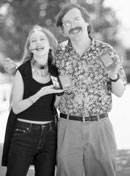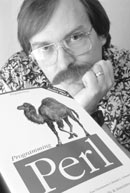Story by Hope McPherson
Photos by Greg Schneider
![]()

Heidi, soon to attend SPU, is "the artist of
the family" says Wall, adding she's also
musical and "interested in anything philosophical."
![]()

Larry and Gloria Wall have four children (left
to right): Heidi, Geneva, Lewis and Aron. "Our kids are extremely varied,"
says Wall.
 Creator of the Perl Programming Language, Larry Wall Redefines
"Techie"
Creator of the Perl Programming Language, Larry Wall Redefines
"Techie" Recently we typed "Larry Wall + Perl" into a few
Internet search engines.
Web Crawler generated 92,310 "hits" -- sites to visit and read about the
unlikely computer guru and
Perl, his popular programming language. InfoSeek delivered 202,266 hits.
Alta Vista?
It spit out 541,572. Not bad for the 1976 Seattle Pacific University
graduate who's now a
computing celebrity and 21st century Renaissance man.
Recently we typed "Larry Wall + Perl" into a few
Internet search engines.
Web Crawler generated 92,310 "hits" -- sites to visit and read about the
unlikely computer guru and
Perl, his popular programming language. InfoSeek delivered 202,266 hits.
Alta Vista?
It spit out 541,572. Not bad for the 1976 Seattle Pacific University
graduate who's now a
computing celebrity and 21st century Renaissance man.
Wall didn't plan to enter the high-tech world. Growing up in Bremerton, Washington, he planned to be a missionary. "I was very much encouraged to go into some sort of full-time Christian work," says Wall, whose father and grandfathers were pastors. With a degree in linguistics and science from SPU, he joined Wycliffe Bible Translators with his wife, Gloria Biggar Wall '79. "We took their training and went off to graduate school," he recalls.
But in graduate school Wall developed food allergies, including reactions to wheat and eggs. "We took that as a big knock upside the head to re-evaluate what direction we were going," he says, adding that one can't be choosy about meals in the middle of Africa. Instead, Wall went to work for Unisys, and later the NASA Jet Propulsion Laboratory (JPL). "It's really hard to make a decision that, on the surface, seems to be the unspiritual one," he admits. "We knew it was the right one; we just didn't know why." Now he knows.
By 1986, Wall needed a computer program that would scan text files, match patterns and print reports based on what it found. He also wanted the program to do various administrative tasks and connect with different interfaces on the JPL and other systems. Uniting his linguistics expertise and computer savvy, Wall created Perl: the Practical Extraction and Report Language. (When the mood hits him, it's the "Pathologically Eclectic Rubbish Lister." Its link to a Middle English poem -- Pearl -- developed after a friend published a poem written with Perl code in The Economist.)
Today Perl's place in the high-tech schemata is secure. "It's the duct tape of the Internet," says Phil Rand, systems administrator for SPU's Office of Computer and Information Systems. "A huge portion of the Internet has something to do with Perl." Says Microsoft contractor Sean Owens '92, "Perl is pretty simple to learn, but has some wonderfully complex text-processing tools. Sorting, reusing, processing, converting -- really anything you might need to do."
Perl also gave Wall an unexpected place on the mission field. Many missionaries now use Perl for language processing. "God wanted me to do something that seems to help missionaries more than if I'd been a missionary myself," he says.
With affable, thoughtful humor, Wall -- like his creation -- seamlessly synthesizes apparently disparate ideas from linguistics, computers, music and religion. In the Perl "README" file, he wrote: "I want you to know that I create nice things like this because it pleases the Author of my story. If this bothers you, then your notion of Authorship needs some revision. But you can use Perl anyway." His declaration didn't slow down Perl's popularity -- or his own.
Often called an "apostle to the hackers," he's quoted scripture to crowds of rebel "techies"; he's lectured that Perl is the first postmodern computer language; he won the 1998 Free Software Foundation Award; and he plays everything from the violin to the conga drums at church. "He is one of the rare people who combines superb computer and math skills with the common touch and a love for literature and ideas," says SPU Professor of English Janet Blumberg, a for-mer faculty advisor.
For Larry Wall, compartmentalizing life is not an option. "Compartmentalization is a useful tool for sanity, but if our sanity comes at the expense of our integrity, then it's not worth a lot," he says, adding he sees compartmentalizing as a coping mechanism. "But why just cope when you can be victorious?" By separating "cultural clap-trappings" from truth, he continues, he's gained a deeper level of comfort. "It's not a false sense of security."
Now with O'Reilly & Associates, a leading publisher of computer books, Wall works from his family's home in Mountain View, California. He and others continue to develop Perl in the open, allowing free access to its source code. Anyone can use it, contribute "bug" fixes or make enhancements.
 Besides working from home, he and Gloria, a writer, are raising their four
children, each with as wide a span of interests as their parents: art,
philosophy, mathematics, music and physics. Now age 18, their eldest will
soon follow in her father's footsteps and enter SPU's University Scholars
Program. "We did not push Heidi to go to Seattle Pacific," says Wall. "We
just told her how it was different from other schools, and she decided
that's exactly what she wanted."
Besides working from home, he and Gloria, a writer, are raising their four
children, each with as wide a span of interests as their parents: art,
philosophy, mathematics, music and physics. Now age 18, their eldest will
soon follow in her father's footsteps and enter SPU's University Scholars
Program. "We did not push Heidi to go to Seattle Pacific," says Wall. "We
just told her how it was different from other schools, and she decided
that's exactly what she wanted."
Easily flowing from one topic to the next, Wall explains Perl and life in general: "It's the basic principle that if you are the right sort of computer language, then you will be the right tool for other things. That's just like if you're the right sort of person when you come out of college, you'll be the right sort of person for jobs that you didn't anticipate or that might not even have existed when you graduated.
"The important thing is not what you know, but knowing how you learn more. It's not knowing the right answer; it's knowing how to ask the right questions."
![]()

| Please
read our
disclaimer.
Send any questions, comments or correspondence about Response to
jgilnett@spu.edu or call 206-281-2051. Copyright © 2000 University Communications, Seattle Pacific University.
Seattle Pacific University |